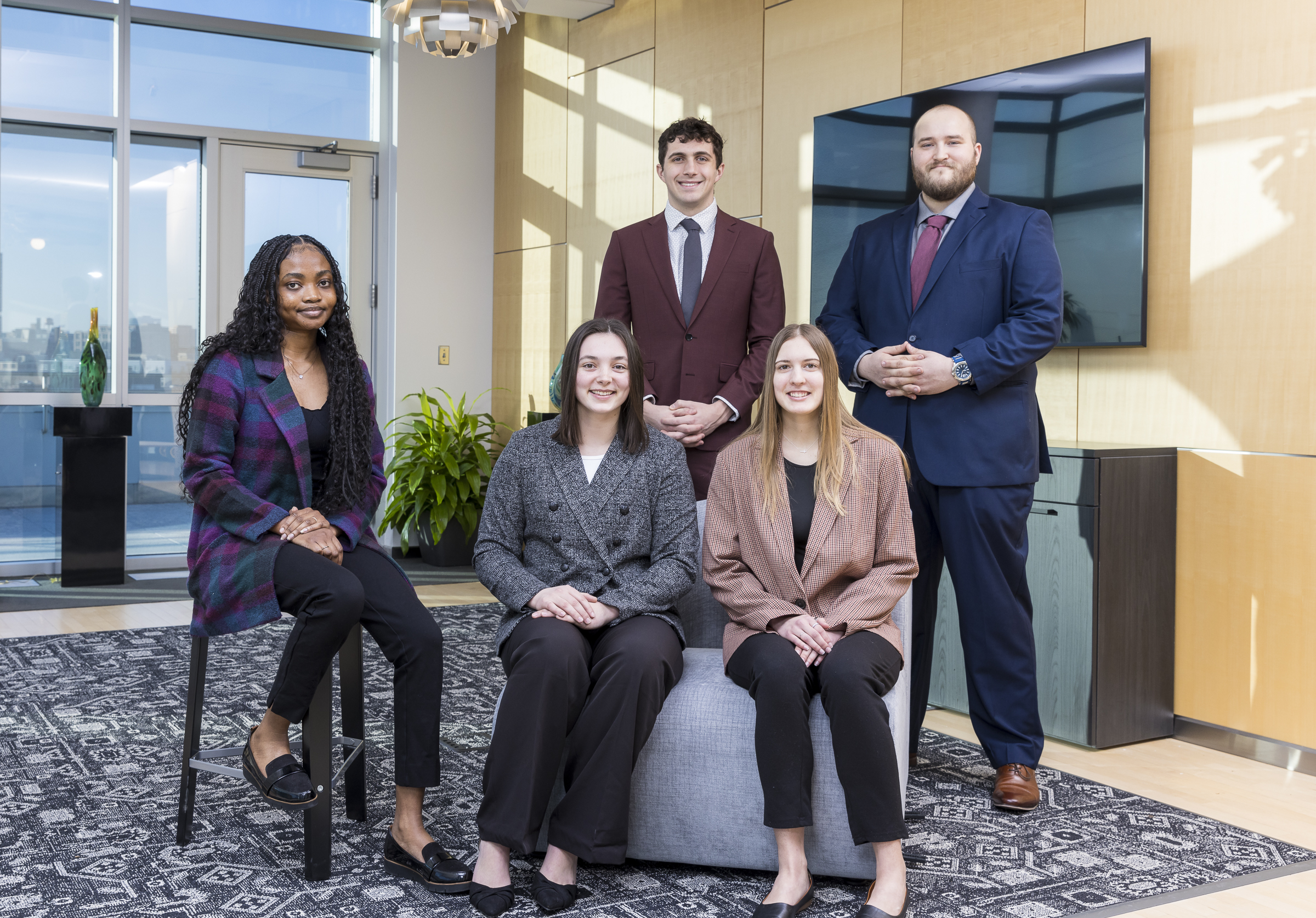This past February, the Gustavus Adolphus College Innovation Scholars presented their project recommendations to mySHO, an early-stage medical company affiliated with Medical Alley, as a culmination of the 2023-24 Innovation Scholars Program.
The presentation was the capstone on four months’ work for this year’s Innovation Scholars: Nana Akua Boakye Agyemang ’25 (Financial Economics major, French minor); Cecilia Gerlach ’25 (Mathematics major, Computer Science minor); Ally Regenold ’24 (Business Management and Psychological Science double major); and Tyler Teichmiller ’24 (Mathematics and Statistics double major, Computer Science minor). Lynnea Myers ’05 served as the students’ campus mentor, and the team’s leader was MS Business Analytics student Xavier Conzet from the University of St. Thomas.
Innovation Scholars is an experiential learning program that engages teams of liberal arts students in the complex processes of translational medicine, taking an idea “from the bench to the bedside.” Project partners include the Mayo Clinic and early-stage Medical Alley companies including MySHO, which provides AI-based mental health therapy digital applications tailored to individual circumstances, such as language preference, psychology, cultural identity, or health challenges.
After being invited to join the Gustavus Innovation Scholars following a written and video application process, the multidisciplinary team of four Gusties spent four months tackling a challenging tech-transfer project focused on MySHO’s innovative evidence-based mental health therapy platform, which features an artificial intelligence chatbot that offers another means by which to expand access to mental health services.
On the Gustavus Health Professions Podcast in April, participants Tyler Teichmiller and Ally Regenold described their experiences with the program. Teichmiller said the Gusties’ multifaceted team proved to be an asset when it came to dividing the project’s tasks. “It was interesting to be in our first meeting together not having known each other that much besides passing each other in the halls or on campus,” he said. “But each of us found the things we were good at and used that to our advantage, and our open communication helped us accomplish what we were supposed to do.”
Regenold cited the benefits of having researched MySHO before the team’s first meeting with company executives and applauded the Innovation Scholars program’s flexibility within the project parameters. “[Xavier] helped us stay on task but also let us figure out things for ourselves, and [Myers] helped us connect with right people here and also met with us one on one every week,” she said.
The project built toward the February presentation at Coloplast, a medical products company in Minneapolis, in front of executives and similar teams from other area colleges that were working with other companies in the program. (Because of the sensitive nature of these early-stage technologies, all Innovation Scholar participants must sign NDAs.) Regenold and Teichmiller agreed that the Gustavus team’s extensive preparation helped soothe any nerves leading up to the high-intensity sessions. “We practiced and re-read the info 1,000 times,” Teichmiller said, “so by the time we went up there, we ended up going over our allotted time because the audience had so many questions. You could really tell how engaged everyone was.”
Regenold added that her biggest takeaway from the experience will serve her well in the sales management training program she’ll begin this summer with Sherwin Williams. “I wanted to push myself outside my comfort zone and see if I could do it, and I realized I could,” she said. “It’s been very valuable to learn these skills and realize that I can believe in myself.”
Teichmiller will begin a statistics PhD program this fall with an eye toward eventually returning to academia as a professor. He said he would have been unlikely to have a co-curricular opportunity like this—working closely with inventors and entrepreneurs—had he not attended a school like Gustavus. “In addition to the work itself, I also gained the ability to network for the first time,” he said. “I had never done that, but it was easier than I expected. It also made me more willing to make mistakes; it’s not a detriment and will help you figure out things in the long run.”
Regenold echoed that, encouraging future Gusties to keep trying new things even if they don’t initially seem like a fit. “Don’t worry if you think your skill sets don’t match what they’re looking for,” she said. “Just apply and see what happens.”
Read more about Innovation Scholars at innovation-scholars.org.

Leave a Reply
You must be logged in to post a comment.